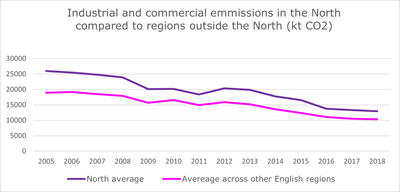The Chancellor must use the Budget to invest in the North’s industry
Article
It is time for the government to match its rhetoric on decarbonisation and levelling up with action, says Jonathan Webb.
Aspirations to decarbonise our economy and level up the country are supposedly priorities for the current government. However, they are missing a trick because so far, little effort has been made to develop and connect these two major policy priorities.
Fundamentally, levelling up must build up local economies by supporting good jobs and ensuring the fair distribution of wealth. Only then will it address regional inequalities. The idea that this can be achieved without serious government investment in regions’ major manufacturing industries is misguided. Government investment creates the conditions for investment that private capital follows. But despite this, government has shown little commitment to realise the potential of, and invest in the industrial heartlands of the North.
Approximately 750,000 people are employed directly in manufacturing industries across the North. These are often well-paid, highly skilled jobs. However, the manufacturing sector is currently carbon intensive. In the years to come, the UK government’s international obligations will require significantly reducing emissions from this sector. In many parts of the North, the damage that deindustrialisation caused towns and cities is remembered well. Unlike the 1980s, this new transition must raise the North up and not level it down.
Without supporting industries to transition to new low carbon production methods, many of these jobs could be at risk- at a time when unemployment in the North is at its highest level for 14 years. A jobs-led recovery out of the pandemic should not just focus on the here and now. It must also lay the foundations for creating the low carbon industry of the future. By accelerating the pace of industry decarbonisation, the UK government can ensure that we bounce back quickly from the pandemic, while also showing strong international leadership in the year that it hosts COP 26.
The environmental case for accelerating the decarbonisation of industry is also clear. While the North has reduced its emissions per capita significantly in the past decade, regions like Yorkshire and the Humber still produce significantly more than the average English region. Per capita emissions include emissions produced from both the production of goods and services and their consumption. In the North, industry is a major contributor to the former. As Figure 1 shows, emissions from industry and commercial activity in the North of England remain higher than the average across regions outside the North.
Figure 1: A major source of emissions in the North comes from industrial activity

If delivered, Boris Johnson’s green industrial revolution can help the North reduce its emissions significantly further. Take steel as an example. Not only does steel have a rich social history in the North, but it also plays a major role in the economies of Sheffield, Rotherham and Scunthorpe among other places. The flooding of the market with cheap steel from 2016 onwards and high energy prices at home have put the industry in a difficult position. Yet with the right support today to tackle these challenges and implement technologies such as Electric Arc Furnaces and hydrogen-based methods of steel production, the industry could become a flagship green industry. Combined with government efforts to increase domestic use of Northern steel and secure export opportunities, the right action could make the industry world leading. This would not only add value to the UK’s overall economy, but it would also help to level up our steel producing towns and cities.
Government investment matters. The green transition must benefit from the resources of the British state and from business investment. But most importantly, it must be just. Unlike other great transformations in history, this one can truly benefit the whole of society. IPPR’s research has highlighted how citizens in industrialised areas of the North don’t just want to see action to tackle the climate crisis, they want to see a fair distribution of the costs and benefits too. Our economic policy must reflect these concerns.
Today the chancellor must outline how he plans to support industry in the North and elsewhere to transition away from the carbon age. We cannot afford to dither and delay. Building the industry of tomorrow requires investing in the education and skills that the future workforce will need today. As well as a new package of support to help key manufacturing industries uptake transitional technologies, investment in education and adult lifelong learning must be announced. The climate crisis will not wait, and neither should the chancellor.
Jonathan Webb is a Senior Research Fellow at IPPR North. He tweets @jrkwebb.
Related items

Change you can board: Delivering better, greener buses
The bus services bill is an opportunity to ensure reform really means thriving, green 21st century local bus networks in England.
Harry Quilter-Pinner on BBC Radio 4 Today discussing political donations

Modernising elections: How to get voters back
Elections are the defining feature of modern democracy. They are the process by which we express a desired future en masse. It is the mass dimension that matters most; it is the mass dimension that is receding.